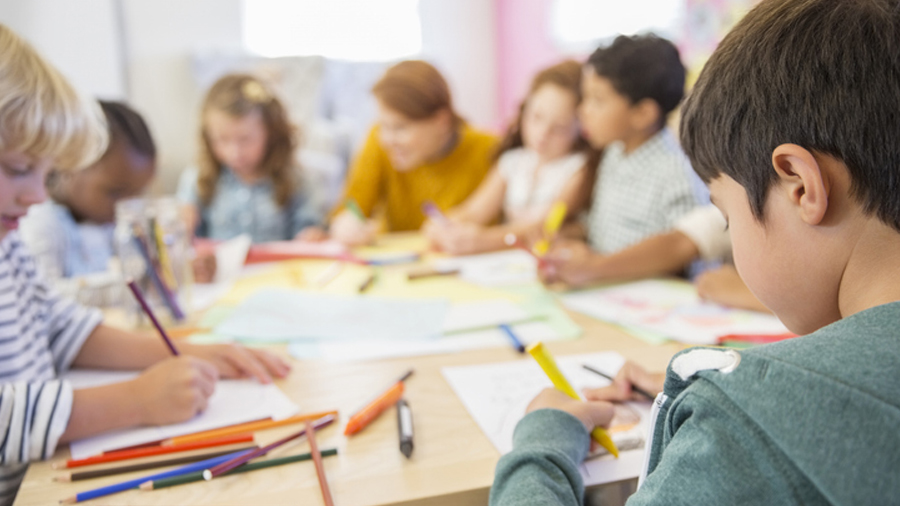Coexistence Skills and Social Context, Neglected in Early Childhood Education Programmes
Early childhood education programmes neglect coexistence skills, which are crucial for living and working together. This is demonstrated by a study involving the UAB, which examined educational policy guidelines in over 50 countries around the world. The study also warns that these programmes barely take into account the influence of the socioeconomic context on children's educational success.

The study, published in the journal PLOS ONE and led by Katarzyna Bobrowicz, researcher at the University of Luxembourg, included the involvement of Pablo Gracia, Distinguished Research Professor in the Department of Sociology at the Universitat Autònoma de Barcelona (UAB) and the Centre for Demographic Studies (CED-CERCA). In addition to these two universities, a researcher from the Technical University of Munich also took part.
Early childhood education, which is offered to children up to the age of 6 or 8 depending on the country, can teach skills that are important throughout life, as demonstrated by numerous international studies. For both social cohesion and today’s professional world, it is important that children learn to cooperate, develop a basic understanding of tolerance and respect, and solve problems together—even before starting school. Likewise, the structural conditions in which children grow up are of great importance for educational success.
However, the research team had observed that coexistence skills—also referred to as citizenship skills, since they are crucial to the functioning of society—and foundational educational requirements were rarely included in early childhood education programmes. In this study, they investigated for the first time whether a global picture could be drawn of the core values underlying these programmes. To do so, they analysed over 90 official documents from 53 countries across all continents, as well as from the European Union and the Organisation for Economic Co-operation and Development (OECD). The documents span the period from 1999 to 2023 and are primarily guidelines, educational plans, and similar publications outlining fundamental educational policy orientations.
Focus on Cognitive Skills
The study shows that early childhood education programmes focus on cognitive skills such as language, information processing, and spatial awareness. In contrast, coexistence skills, which are important for living and working together, play only a secondary role. Socio-emotional skills, such as recognising and managing one's own and others' emotions, were included in the position papers of international organisations and some countries.
The programmes predominantly emphasise talent, effort, and personal responsibility as key to later educational success. Factors beyond individual control—such as socioeconomic conditions of the family context, personality traits, and stressful events like forced migration or illness—are rarely mentioned. The importance of support from family, friends, teachers, and society is also seldom addressed.
Concerns About the Social and Educational Values Being Promoted
"Our study raises concerns about the social and educational values currently promoted by early childhood education policies," explains Pablo Gracia. "Education prioritises individual competence skills, such as academic ability, while community- and citizenship-based skills receive little attention. Reforms rarely recognise structural inequalities, such as family background or systemic privilege, when defining the 'winners' in society. These policies promote a meritocratic economic mindset: success is framed as a matter of talent and effort, minimising the role of social context," the UAB researcher points out.
Researchers believe that further studies are needed to explore to what extent educational policy guidelines are reflected in the actual practice of early childhood education. "At the individual level, children may internalise the idea that everything can be achieved through effort, without understanding that success also depends on others—or simply on chance", notes Samuel Greiff, researcher at the Technical University of Munich and co-author of the study. "At the systemic level, we see the danger that, in some countries, a competition is already emerging among nurseries and kindergartens over which institutions invest more in children's cognitive performance, while other educational goals are neglected. At a time when we are concerned about social cohesion and democratic understanding, failing to promote these necessary skills is counterproductive," he adds.
"If we want to build societies that are more efficient and equal, we must promote a broad variety of important skills for children and adults, and help citizens understand that 'success' is largely explained by contextual and random factors. This greatly encompasses what is currently labeled as 'talent' and 'effort' within the dominant meritocratic mindset," concludes Pablo Gracia.
Article: Bobrowicz K, Gracia P, Teuber Z, Greiff S (2025) The meritocracy trap: Early childhood education policies promote individual achievement far more than social cohesion. PLOS ONE 20(7): e0326021. https://doi.org/10.1371/journal.pone.0326021